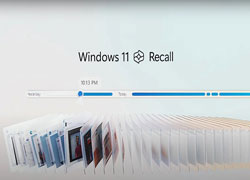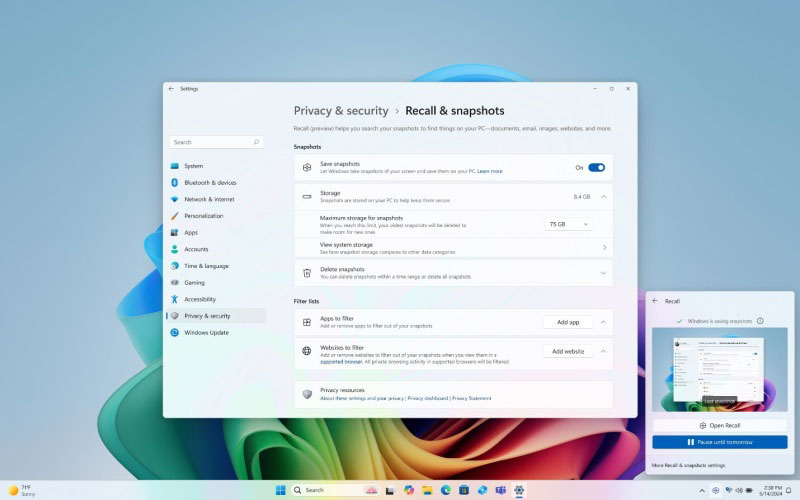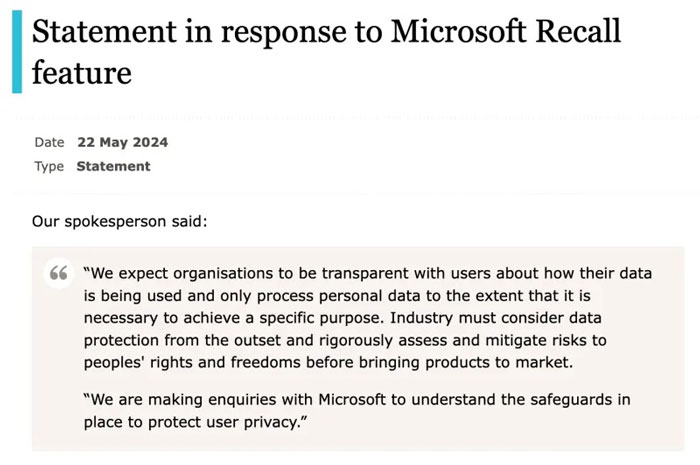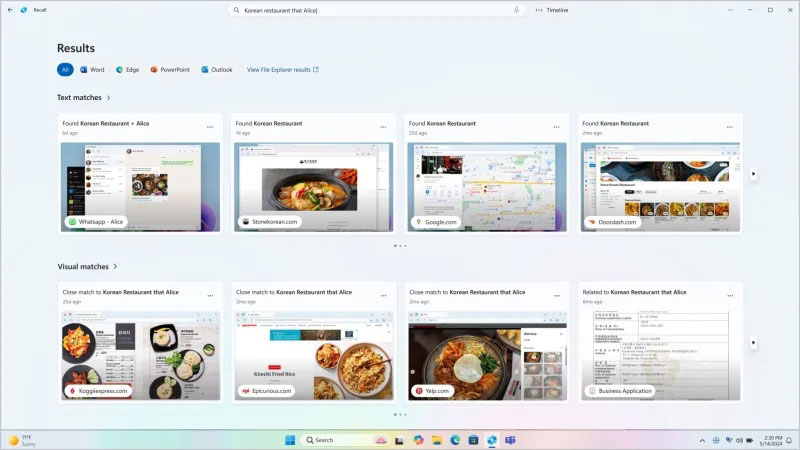New “Normal” with artificial “intelligence”?
 Microsoft Introduces "Always Watch " or "Recall " Feature for Every PC
Microsoft Introduces "Always Watch " or "Recall " Feature for Every PC
Welcome to the future where your computer knows more about your life than you think. Microsoft's latest invention, the AI-powered Windows 11 Recall feature, announced at an AI event on Monday, is a technological marvel that... remembers everything you've done. on your computer in the last three months. Sounds practical, right? Only if you can get used to the idea of the computer playing the role of Big Brother.
This amazing, or scary, feature is currently only available on Copilot+ computers with Snapdragon X ARM processors. But don't worry, Intel and AMD users: Microsoft has assured us that they are working hard to include you in this dystopian dream. Recall takes a screenshot of the active window every few seconds, turning the screen into a kind of digital diary. These snapshots are analyzed by the device's on-board neural processing unit (NPU) and artificial intelligence model to extract data and store it in a semantic index. It allows users to view their history or search for specific points using human language search. How convenient...
“Recall is a key part of what makes Copilot+ PCs special, and Microsoft built privacy into Recall's design from the start. On a Copilot+ PC with a Snapdragon® X-series processor, you'll see a Recall icon in your system tray the first time you activate your device. You can use this icon to open Recall's settings and choose which snaps Recall collects and stores on your device. You can limit the number of snapshots that Recall collects, for example you can select specific applications or websites visited in a supported browser to filter; Additionally, you can pause snapshots using the Restore icon in the taskbar, clear some or all saved snapshots, or delete all snapshots from your device.”
❖ Microsoft
It looks like this feature will be enabled by default. Microsoft happily explains: “ By default, Recall is allocated 25GB on a 256GB device, allowing approximately 3 months of snapshot storage. You can increase the memory allocation for the call in your PC settings. Old snapshots are deleted when the allocated memory space is exhausted so that new snapshots can be saved ."
Safety? What kind of security?!

According to Microsoft, Recall “ does not take pictures of certain content, including InPrivate web browsing sessions in Microsoft Edge. It applies similarly to content protected by digital rights management (DRM); Like other Windows applications such as Snipping Tool, Recall does not store DRM content ."
Oh, that's reassuring. Therefore, no screenshots of your Netflix sessions are taken. What about the rest? Your passwords, your personal email, your banking details are all at risk. And if you're not using Microsoft Edge, you're out of luck.
Microsoft promises that all this data will be encrypted using BitLocker and stored only on the user's device. They even assure that data will not be shared with other users of the same device, and screenshots of InPrivate windows will not be saved in Microsoft Edge. Oddly, however, they haven't commented on whether something like Firefox or Brave's private tab mode gets the same courtesy. What's the point of using privacy technologies if the operating system itself records everything you do?
At the press conference, Yusuf Mehdi, corporate vice president and chief consumer marketing officer, emphasized the company's conservative approach. “ We don't use this information to train the AI model and give you full control with the ability to edit and delete everything that is recorded ,” Mehdi said.
But let's take a step back and breathe in the pungent smell of skepticism. Big tech companies are notorious for exploiting user data, and Microsoft isn't exactly a model of restraint. The UK data protection authority ICO (Information Commissioner's Office) has already intervened and is demanding assurances that user data will be protected.

Scary Effects
Even if we trust companies that Microsoft won't touch our data, the security and privacy implications are huge. Recall doesn't mean anything when it takes screenshots, capturing everything from sensitive documents to your recent Amazon purchases. Did you forget to disable this feature? Your partner or roommate may stumble across your private moments with a quick search.
However, this is just the tip of the iceberg.
Not to mention the huge gap this creates for cyber threats. Once your device is hacked, all your carefully cataloged data is in someone else's hands. Cybersecurity expert Kevin Beaumont, a frequent critic of Microsoft, compared the feature to "a keylogger built into Windows" and noted that malware could easily steal the revocation database and use it for nefarious purposes . He is not wrong about this. Imagine if an attacker or malware were to gain access to this treasure trove: credentials, confidential documents, private messages - everything would be exposed.
Microsoft's priorities are in question
Microsoft has historically tried to shift the blame to the user when a device is compromised. This new feature appears to take that philosophy to the next level, creating additional risk in an already dangerous digital environment. Satya Nadella, Microsoft CEO, emphasized the importance of prioritizing security in a recent email to his employees. “ If you have to choose between security and another priority, your answer is clear: choose security ,” Nadella said.
Still, Microsoft is excited to introduce a feature that could be a goldmine for hackers. If this is their idea of security, then it’s scary to imagine what less secure innovation might look like.

Recall's ability to log every user action, taking screenshots every few seconds and storing them for up to three months, signals a profound shift in how tech companies view and process our personal data. It's not just a feature, but an open invitation to surveillance mode, where every keystroke, every click and every glance is recorded and potentially shared. This is because this technology not only records our digital activities, but also normalizes the concept that every moment we spend on our devices can be recorded and analyzed.
Beyond the immediate security risks, Recall undermines trust in the technology itself. Users expect their devices to support them, not to track their every move as potential spies. This feature challenges that trust and makes it difficult for consumers to trust that tech companies have their best interests at heart.
The advent of end-to-end encryption, VPN and private browsing comes as the public is increasingly demanding control over their personal data. But Microsoft's recall undermines that progress and returns the clock to an era of uncontrolled data collection. Even with the promise of encryption and local storage, collecting and indexing this data creates risks that are difficult, if not impossible, to mitigate.
Cybercriminals can use this treasure trove of information for identity theft, fraud, or industrial espionage. Governments could use it to monitor their citizens.
The most insidious aspect of a recall is the precedent it sets. If Microsoft can normalize such extensive data collection under the guise of utility, what's to stop other tech giants from following suit? We're already seeing a steady rise in invasive features in the tech space—think smart home devices that eavesdrop on conversations, or social media platforms that monitor every interaction to serve targeted ads. The recall reinforces these concerns many times over.
Imagine a future where all devices, from smartphones to smart refrigerators, have similar “features.” The consequences are frightening. This not only undermines privacy, but also sets a legal and cultural precedent for subordinating privacy to convenience. The concept of personal space is becoming a relic of the past, even in the digital world. And a related question arises: is this function for the convenience of whom?



